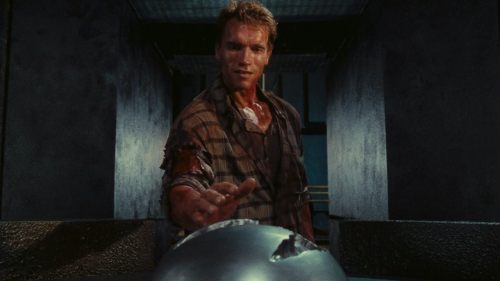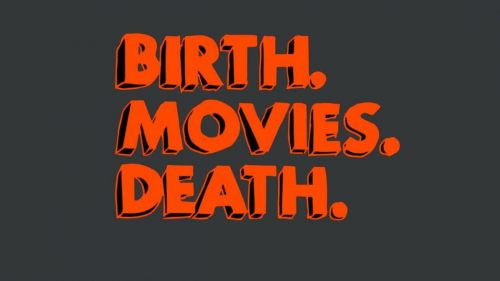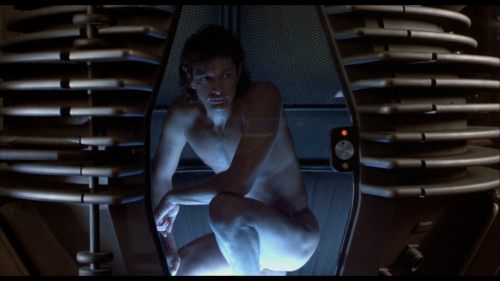The Cronenberg TOTAL RECALL That Never Was
Artist Ron Miller's concept art for Cronenberg's Total Recall - see more here.
Total Recall is a nearly perfect movie -- full of Schwarzenegger self-satire, beautifully rendered practical special effects and a wonderful blend of smart science fiction and gratuitous pulpy action. But what if the movie had mutant space camels? Oh God, what have we been missing all this time?
Total Recall took its sweet time in its journey to the big screen. Based on a short story by science-fiction master Philip K. Dick, the movie was first bought for development by Ronald D. Shusett in the ‘70s. Shusett invited future Alien collaborator Dan O’Bannon to help flesh out the 23 page short story into a feature-length film. Shusett and O’Bannon’s script was a mess of conflicting ideas -- with O’Bannon pushing for a weighty science fiction concept with an ending that saw the hero transformed into a godlike synthetic being housing the entirety of the Martian race and Shusett keen on creating Raiders Of The Lost Ark on Mars.
The two took the script to Disney, where Shusett had a development deal after the success of Alien, but the studio passed -- allowing mega-producer Dino De Laurentiis to swoop in and acquire the project. While early attempts to rework the script’s third act with directors Richard Rush (The Stunt Man) and Lewis Teague (Cujo) didn’t work out, it was hoped that Canadian filmmaker David Cronenberg would be the one to crack the code for successfully bridging Philip K. Dick’s ideas to the fun adventure film the producers’ had envisioned for the project. Unfortunately, nobody told Cronenberg this.
Cronenberg spent a year on the script -- stripping away any sense of levity and camp that had been layered onto Dick’s story. The result was something thematically very faithful to the original short story but in direct contrast to what the producers had hired Cronenberg to make. Cronenberg’s vision for the film’s protagonist was actor William Hurt. Douglas Quaid was a psychologically wrecked man struggling to piece his memories together. Of course, it was Cronenberg, undisputed master of body horror, who also introduced the concept of mutants into Total Recall. Without Cronenberg’s involvement, we would never have had Kuato, the tumorous oracle who leads the Martian rebellion, or any of the other malformed mutants who make the Red Planet their home. Cronenberg also took the concept of Ganzibulls, Martian creatures created by Shusett that were basically camels outfitted with oxygen masks, and turned them into sewer-dwelling mutant camels.
Cronenberg, faced with the reality that the movie he hoped to make was in stark contrast to the movie he had been hired to make, left the project around the same time Richard Dreyfuss became attached to star. As the years passed, the project continued to evolve -- and even came close to shooting with director Bruce Beresford and Patrick Swayze. Of course, the film would eventually get made with director Paul Verhoeven and Arnold Schwarzenegger, but Cronenberg’s legacy does not end there.
After Total Recall was an international success, Gary Goldman, the writer that was hired to polish up the script for Paul Verhoeven, decided to option another Philip K. Dick short story for his directorial debut -- Minority Report. After talking with Verhoeven in the hopes the filmmaker would lend his name to the project as a producer, Verhoeven convinced Goldman that Minority Report would make a perfect sequel to Total Recall. Unbeknownst to Goldman and Verhoeven, though, Ronald D. Shusett had it in his contract to write the first draft to any sequel to Total Recall. Shusett agreed to Goldman’s suggestion that they co-write the sequel together and that the contract be amended that Goldman would be attached to co-write any sequels.
It was through the concept of mutants, brought to the story by Cronenberg, that Shusett and Goldberg found the way to connect Minority Report’s story to the world of Total Recall. In the final filmed version of Total Recall, it was established that the mutants had some degree of precognitive ability. In Goldman’s script for Total Recall 2, Quaid becomes the head of a company who uses the mutants to see into the future and predict crimes before they happen.
Unfortunately, just as the project was building momentum, Carolco Pictures, the film’s studio, went out of business and the writers were able to take the project to 20th Century Fox. Unfortunately, it was at Fox that Verhoeven was betrayed by his former cinematographer Jan De Bont, who had been eying the script and worked with Fox to wrestle it away from Verhoeven. De Bont and the studio proceeded to strip the script of all connections to Total Recall and set the story up as its own project. After a series of flops (Speed 2 and The Haunting) from De Bont, Fox lost interest in making the project. It was at this point that Spielberg stepped in and developed the project -- combining elements of both the De Bont draft and Goldman and Shusett’s draft. De Bont, Goldman and Shusett would all receive producer credits on Spielberg’s final film, and Goldman and Shusett would find their contract evoked one more time when Dimension Films bought the rights to Total Recall, intending to make a sequel.
For more information on the making of Total Recall (and its proposed sequel), check out David Hughes’ excellent book Tales From Development Hell -- Hughes goes into great detail exploring the troubled production history of films such as Darren Aronofsky’s Batman, Paul Verhoeven’s Crusade and more.
This was originally published in the "Space: The Final Frontier" issue of Birth.Movies.Death. See Total Recall at the Alamo Drafthouse this month!



